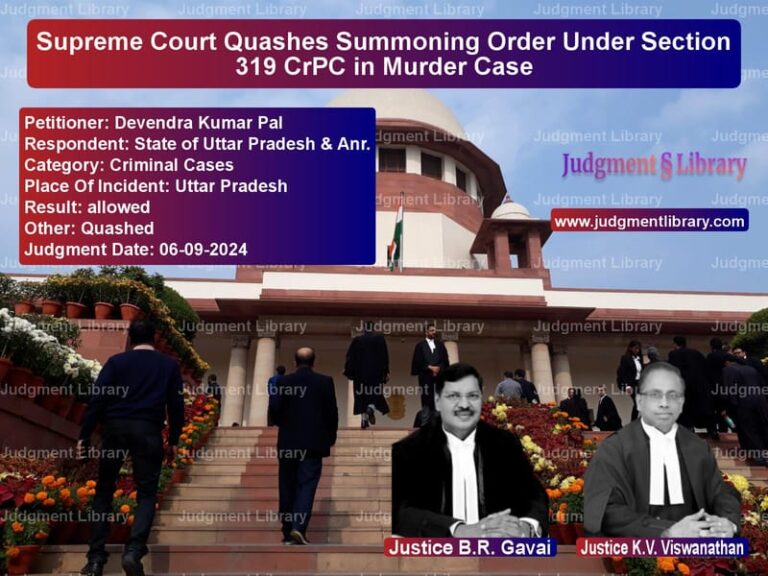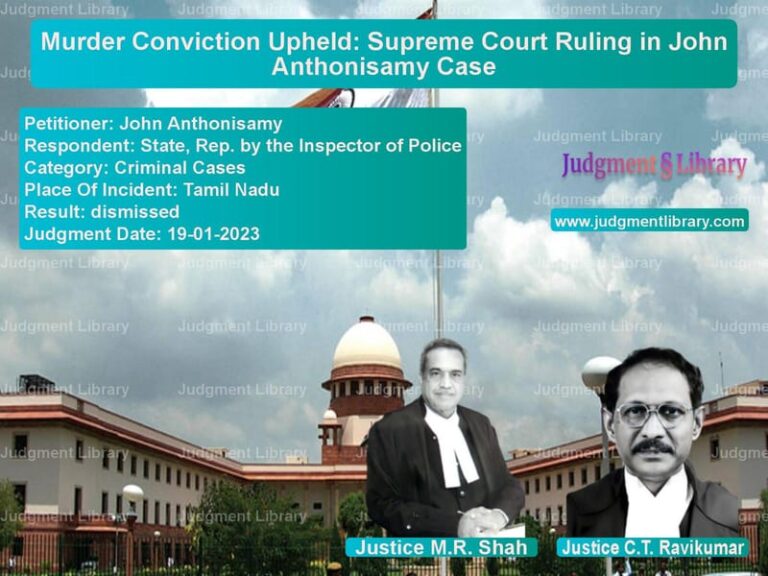Supreme Court Upholds Advocate on Record System: Challenge to Exclusive Filing Rights Dismissed
The Supreme Court of India recently ruled in the case of Nandini Sharma & Anr. v. Registrar Supreme Court of India & Ors., addressing the validity of the Advocate-on-Record (AOR) system under the Supreme Court Rules, 2013. The petitioner challenged the exclusive right granted to AORs for filing cases in the Supreme Court, arguing that it violated the constitutional rights of other advocates under Articles 14 and 19(1)(g) of the Constitution.
Background of the Case
The petitioners, who were practicing advocates, filed a writ petition under Article 32 of the Constitution, challenging the provisions in the Supreme Court Rules, 2013, which allow only Advocates-on-Record to file cases in the Supreme Court. They contended that these rules discriminated against other advocates who were equally qualified to represent clients before the Court.
The petitioners sought to have Rule 1(b), Rule 5, and Rule 7(c) of Order IV of the Supreme Court Rules, 2013, declared void on the grounds that they were unreasonable, discriminatory, and in violation of fundamental rights.
Petitioner’s Arguments
The petitioners, appearing as parties-in-person, presented the following arguments:
- The Advocate-on-Record system unfairly restricted the rights of advocates under Section 30 of the Advocates Act, 1961, which allows all advocates to practice before any court in India.
- The system created an artificial distinction between advocates, favoring AORs and excluding other advocates from filing cases.
- Article 19(1)(g) of the Constitution guarantees the right to practice any profession, and the AOR system imposes an unreasonable restriction on this right.
- The petitioners relied on a judgment from the Patna High Court that struck down a similar AOR system in the Patna High Court, arguing that the Supreme Court should follow the same precedent.
Respondent’s Arguments
The respondents, represented by the Bar Council of India and the Supreme Court Registry, defended the AOR system, presenting the following arguments:
- The Supreme Court Rules, 2013, derive their authority from Article 145 of the Constitution, which empowers the Court to regulate its own procedure, including deciding who can file cases.
- Section 52 of the Advocates Act, 1961, explicitly preserves the Supreme Court’s power to make rules about who can act or plead in the Court.
- The AOR system is essential to ensure that filings before the Supreme Court are handled by advocates with specialized knowledge of the Court’s procedures.
- The system enhances the efficiency and integrity of the Court’s work and has been upheld in previous judgments, including In Re: Lily Isabel Thomas (1964) and Harish Uppal v. Union of India (2003).
Supreme Court’s Observations
The Supreme Court examined the legal basis of the AOR system and made several key observations:
- The power to regulate who can file cases in the Supreme Court falls squarely within Article 145 of the Constitution.
- The Court has consistently upheld the AOR system, recognizing it as a necessary procedural safeguard to ensure the quality and standard of filings.
- Section 52 of the Advocates Act, 1961, explicitly supports the Supreme Court’s power to prescribe conditions for practice before it.
- The requirement for advocates to pass an examination to become an AOR is not arbitrary but ensures that only qualified professionals handle Supreme Court filings.
- The Patna High Court decision striking down a similar AOR system was not applicable, as the Supreme Court’s power to regulate its own procedure is constitutionally protected.
Supreme Court’s Verdict
The Supreme Court dismissed the petition and upheld the validity of the Advocate-on-Record system. The key conclusions were:
- The AOR system is constitutionally valid and is supported by Article 145 of the Constitution and Section 52 of the Advocates Act.
- There is no violation of Article 14 or Article 19(1)(g), as the classification of AORs serves a legitimate purpose.
- The examination process for becoming an AOR ensures that only competent advocates handle filings, enhancing the efficiency of the Supreme Court.
Key Takeaways from the Judgment
This ruling reinforces the authority of the Supreme Court to regulate its own procedures and confirms the validity of the AOR system:
- Judicial Independence: The Supreme Court has the exclusive power to decide who can file cases before it, ensuring procedural discipline.
- Professional Standards: The requirement for advocates to qualify as AORs maintains the quality of filings and prevents procedural inefficiencies.
- Legal Precedent: The judgment aligns with previous rulings that have upheld the AOR system, reinforcing its necessity.
Conclusion
The Supreme Court’s ruling in Nandini Sharma & Anr. v. Registrar Supreme Court of India & Ors. reaffirms that the AOR system is a valid and essential part of the Court’s functioning. By dismissing the challenge, the Court has upheld its right to regulate the quality of legal representation before it, ensuring that only trained advocates handle filings and procedural matters. This decision strengthens the institutional integrity of the Supreme Court and preserves its ability to manage its workload efficiently.
Petitioner Name: Nandini Sharma & Anr..Respondent Name: Registrar Supreme Court of India & Ors..Judgment By: Justice K. M. Joseph, Justice Hrishikesh Roy.Place Of Incident: New Delhi, India.Judgment Date: 16-11-2022.
Don’t miss out on the full details! Download the complete judgment in PDF format below and gain valuable insights instantly!
Download Judgment: nandini-sharma-&-anr-vs-registrar-supreme-co-supreme-court-of-india-judgment-dated-16-11-2022.pdf
Directly Download Judgment: Directly download this Judgment
See all petitions in Fundamental Rights
See all petitions in Constitution Interpretation
See all petitions in Legislative Powers
See all petitions in Judgment by K.M. Joseph
See all petitions in Judgment by Hrishikesh Roy
See all petitions in dismissed
See all petitions in supreme court of India judgments November 2022
See all petitions in 2022 judgments
See all posts in Constitutional Cases Category
See all allowed petitions in Constitutional Cases Category
See all Dismissed petitions in Constitutional Cases Category
See all partially allowed petitions in Constitutional Cases Category







